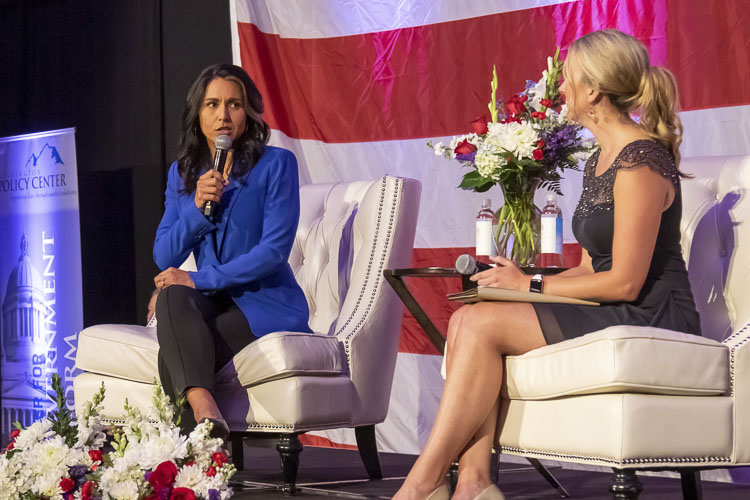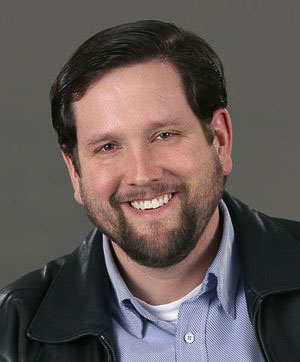
David Boze of the Washington Policy Center shares the theme offered by former Congresswoman Tulsi Gabbard
David Boze
Washington Policy Center
The ballroom at the Davenport Grand bustled with guests weaving their way around white linen-covered tables, gathering up in small groups while catching up with old friends and occasionally making new ones. As the clock closed in on 7 p.m., WPC’s countdown video began, playing clips from great speakers past until coming to a close with WPC Chair Mark Pinkowski taking the stage, welcoming guests, and pitching the emcee duties to WPC’s outgoing long-time Eastern Washington Director Chris Cargill (who received a warm tribute and standing ovation at the end of his final program).

More than 900 people had come to Spokane to support Washington Policy Center’s mission of providing free-market solutions and analysis for our state. Hundreds raised their hands to indicate they were joining a WPC event for the first time, showing the enthusiasm and hunger for market-based ideas and reform.
The program began by honoring the United States with the pledge of allegiance and our national anthem, memorably performed by Scotty Nicol. Many in the crowd were moved to join him in song for the final lines. With an enormous American Flag serving as backdrop to the main stage and the patriotic spirits enlivened by the anthem, guests were primed for an evening devoted to the premiere free market think tank of the Northwest.
Our two keynote speakers brought hope and warning. Acclaimed historian and author Victor Davis Hanson warned of weaponized politics, broken institutions, dangerous spending, and ideological intolerance. He pointed to the growing power of China and the declining deterrence of the United States that added to the risk of war. He lamented state legislatures changing election rules at the last second in order to aid in the defeat of a specific candidate, and revealed a nation divided in ways unimaginable only twenty years ago, a nation in desperate need of reviving its constitution and institutions. Dr. Hanson reminded us that our constitutional republic is getting old, but the ideas are timeless and worth taking a stand for.
Former presidential candidate and congresswoman Tulsi Gabbard remarked on “moral rot” corrupting in our civic debates and social media. She warned of the influence of big tech censorship. She challenged the notion that parents should be denied information about what their kids are learning in the classrooms. Gabbard also called for a new political leadership. Leadership that would commit to solutions that work, not just to the party-politics that support them. Her vision was one of hope for a better future, and a new spirit of tough debate but patriotic civility, what she called the “Aloha spirit.” She declared that success is possible because it is necessary, and that she believed increasing numbers of Americans are understanding that.
Melanie Stambaugh, the charismatic former state legislator and independent business owner from Puyallup, led the conversation with Tulsi. Both women shared an early start in their respective state legislatures, with Tulsi Gabbard elected to the Hawaiian state legislature at the age of 21 and Stambaugh to the Washington state legislature at 24.
Throughout the questioning, Gabbard focused on the need for placing service and solutions above party and politics and the need for independent thinking. She expressed incredulity that her declaration that “parents should raise their children, not the government” was a controversial statement in the country today, calling the backlash she faced both “hilarious” and “frightening” and warned of the tendency for opponents including the politically powerful and those in big tech, to silence or suppress those with whom they disagreed.
Among the first instructions Gabbard received as a new legislator was to not work with Republicans – especially Republicans in swing districts. Even if a bill was good, if a problem for the people could be solved, she was told to sit on the idea and wait because credit could not be allowed to the other side.
Gabbard saw this approach as putting politics before people. After all, those who have the problem needing solved would continue to suffer even while the warring political factions held out on the solutions. Gabbard related how this approach conflicted with how she was raised and her sense of duty and service.
She said that when she served in Iraq, a sign above the exit gate asked ‘Is today the day?” It was a sobering reminder for those who left the relative safety of the base that they might be called to the ultimate sacrifice at any time. “Is today the day?” It was a reminder of how fragile our lives are, as well as what is truly important. So while other political leaders fretted over their invite to the White House Correspondents Dinner, she felt her service kept her grounded in her job and her priorities.
When asked why she endorsed socialist Bernie Sanders for President in 2016, she said it was her way of making a statement to power brokers within her party, including Hillary Clinton, and her best path at obtaining a national audience for her views.
By the end of her remarks, Gabbard received her second standing ovation of the night, and left WPC’s guests inspired, motivated and hopeful.
While Gabbard laid out a host of problems we face as a nation, her primary message was one of duty, service and hope. Americans are getting more involved, they are awakened to what’s happening around them.
Most of all, Americans would succeed because we have to. We have no other option.
And so it is in Washington state. This is our home. It is majestic in its diverse, natural beauty and it is consequential in its influence. That’s why bad ideas won’t stay in Washington, they will spread. Our state is iconic, and our influence has grown. That is also why good ideas must take root in Washington and challenge the status quo wherever needed.
Washington Policy Center exists to make Washington a better place to live, work and raise a family. There’s no giving up, and no giving in. Guests at the Eastern Washington Annual Dinner took that message home. It is our hope that they share it and make it grow.
David Boze is the communications director at the Washington Policy Center.
Also read:
- Letter: ‘It’s said sarcasm is the lowest form of wit’Amboy resident Thomas Schenk criticizes Olympia’s use of “emergency clauses” and other legislative tactics that limit public participation.
- Letter: ‘We’re going to give them some money and a plane ticket, and then we’re going to work with them’Camas resident Anna Miller supports a new structured self-deportation policy, calling it a balanced approach to immigration and economic needs.
- Opinion: What the 2025 legislature tells us about why Washington’s government keeps failingTodd Myers of the Washington Policy Center argues that Washington’s government fails because it resists humility, experimentation, and accountability in its policymaking.
- Letter: Vancouver needs broader leadership than just a teacher’s lensVancouver resident Peter Bracchi urges Mayor Anne McEnerny-Ogle not to seek another term, calling for more diverse and inclusive leadership rooted in broader experiences.
- Opinion: Legislative session ‘was full of ups and downs and many learning experiences’Rep. John Ley reflects on the 2025 legislative session, highlighting local funding victories and warning of major tax increases passed by the majority.










